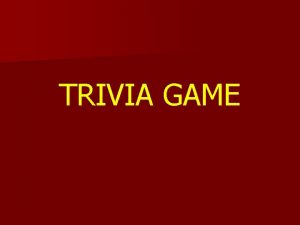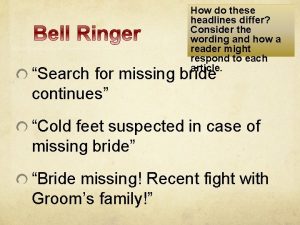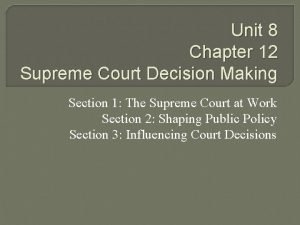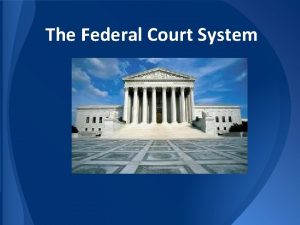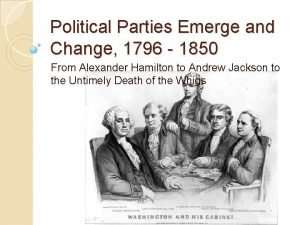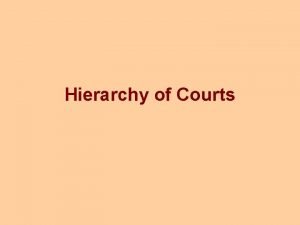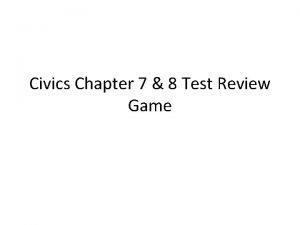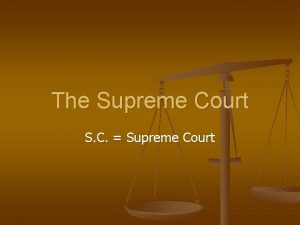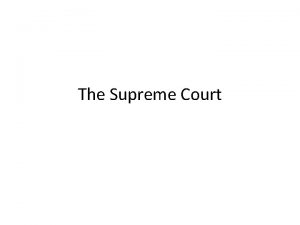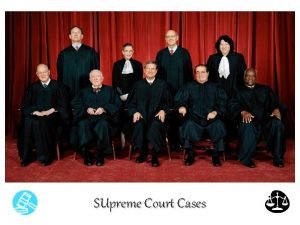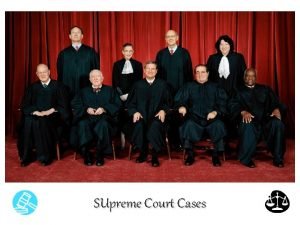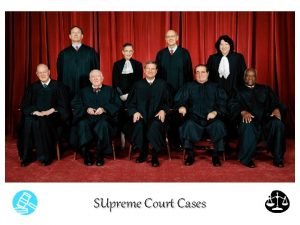The Supreme Court Why Supreme Court important Power







- Slides: 7

The Supreme Court

Why Supreme Court important? -Power constitutional interpretation -Resolves conflicts that arise over constitutional workings of branches + layers of govt+ over protection rights entrenched in the Bill of Rights. -By convention- supreme court has power of Judicial Review which it discovered in Marbury V Madison 1803 when it first declared an act unconstitutional. Judicial Review (JR) - Laws or parts laws passed by congress incompatible with constitution- e. g. - us of line item veto struk down by court in Clinton V New York in 1998 - First time court declared state law unconstitutional was in Fletcher V Peck 1810 - Presidential actions can also unconstitutional e. g. - Nixon claim of executive privilege over Watergate tapes 1973. - Power JR not in constitution itself. Marbury V Madison determined constitution is superior to laws passed by congress, thus increasing power interpretation of court. - Courts power JR over presidential congressional+ state actions determining their constitutionality= main reason court described political as well as judicial institution.

Judicial Independence- strict separation between judiciary and other branches. Judicial Activism- adhere to loose constructionism- interpret constitution in terms of modern day Courts that were Judicially active: Warren Court -Brown V Board of education of Topeka -Miranda V Arizona Burger Court -Roe V Wade -Swann V Charlotte Mecklenburg Board of Education Judicial Restraint- Strict Constructionism and follow the original intent of the founding fathers Courts that were judicially restraint: Rehnquist Court

Protection of Rights -Inalienable rights of US citizens are entrenched in the first 10 amendments of the Bill of Rights and protected by the Supreme Court using its powers of constitutional interpretation and Judicial Review Rights of minorities. Grutter V Bollingor said racial profiling was constitutional for uni admissions Religion. Engel V Vitale upheld freedom of religion Freedom of speech. Citizens United V Federal Election Commission ruled that corporations and unions have the same 1 st amendment free speech rights as individuals in election campaigns.

Limits on Supreme Court - No power of initiative (cant pick and choose)- can only respond to cases that are submitted to it. Some instance, judges show self restraint- don’t want to be seen playing politics. Court cant in long run disregard public opinion. Although difficult, Congress + states can initiate constitutional amendment if oppose ruling court. 1895 court declared federal income tax unconstitutional. Amendment XVI ratified 1913 specifically authorising such a tax. - Limited in ability to enforce its rulings. - -Courts follow precedent eg court’s reluctance to overturn Roe V Wade

Is the supreme court too powerful politically? Yes -presidents use power of appointment to boost their own views, eg- Reagan made 344 judicial appointments to federal courts, 6 to special courts, 4 to Supreme Court-ensured conservative leanings -Bush carried on same policy appointing another 187 conservative judges. Democrat Clinton appointed judges who reflected his political views, - 28% black and 36% women. Also appointed liberal judges to supreme court. Ginsberg and Breyer. -Once appointment supreme court judges permanent- influence of Reagan still strong in the court today -Areas court decides on are politically crucial eg Bush V Gore -The balance of the modern court is a political tightrope- slight change adjust political attitudes plus lead to controversial political decisions on issues like abortion. -Through system of amicus curiae briefs court will be subject to political pressure from all sorts of interests. No -Presidents appoint judges but have to be made with advice+ consent of senate -Judicial Review is essential to protect the civil rights of citizens. Women US welcomed protection given to them by Roe V Wade against the laws of some state legislatures. -Supreme court decisions don’t change anything. Brown V Board of education led to little change until laws were passed to enforce the ideas. -Constitutional amendments have changed supreme court decisions eg- the Dred Scott decision was wiped out by 13 th and 14 th amendments.

Comparison with UK Judiciary -Fusion of Powers in the UK- don’t enjoy an independent Judiciary -However increased independence UK judiciary due to Constitutional Reform act 2005 -Methods of selection UK limit influence of politicians- this is an issue in the US however
